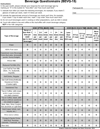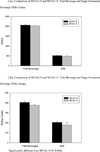Development of a brief questionnaire to assess habitual beverage intake (BEVQ-15): sugar-sweetened beverages and total beverage energy intake
- PMID: 22709811
- PMCID: PMC3379009
- DOI: 10.1016/j.jand.2012.01.023
Development of a brief questionnaire to assess habitual beverage intake (BEVQ-15): sugar-sweetened beverages and total beverage energy intake
Abstract
Introduction: Energy-containing beverages, specifically sugar-sweetened beverages, may contribute to weight gain and obesity development. Yet, no rapid assessment tools are available which quantify habitual beverage intake (grams, energy) in adults.
Objective: Determine the factorial validity of a newly developed beverage intake questionnaire (BEVQ) and identify potential to reduce items.
Methods: Participants from varying economic and educational backgrounds (n=1,596, age 43±12 years, body mass index [calculated as kg/m(2)] 31.5±0.2) completed a 19-item BEVQ (BEVQ-19). Beverages that contributed <10% to total beverage, or sugar-sweetened beverages, energy and grams were identified for potential removal. Factor analyses identified beverage categories that could potentially be combined. Regression analyses compared BEVQ-19 outcomes with the reduced version's (BEVQ-15) variables. Inter-item reliability was assessed using Cronbach's α. Following BEVQ-15 development, a subsequent study (n=70, age 37±2 years; body mass index 24.5±0.4) evaluated the relative validity of the BEVQ-15 through comparison of three 24-hour dietary recalls' beverage intake.
Results: Three beverage items were identified for elimination (vegetable juice, meal replacement drinks, and mixed alcoholic drinks); beer and light beer were combined into one category. Regression models using BEVQ-15 variables explained 91% to 99% of variance in the four major outcomes of the BEVQ-19 (all P<0.001). Cronbach's α ranged .97 to .99 for all outcomes. In the follow-up study, BEVQ-15 and three 24-hour dietary recalls' variables were significantly correlated with the exception of whole milk; BEVQ-15 sugar-sweetened beverages (R(2)=0.69), and total beverage energy (R(2)=0.59) were more highly correlated with three 24-hour dietary recalls' than previously reported for the BEVQ-19. The BEVQ-15 produced a lower readability score of 4.8, which is appropriate for individuals with a fourth-grade education or greater.
Conclusions: The BEVQ-19 can be reduced to a 15-item questionnaire. This brief dietary assessment tool will enable researchers and practitioners to rapidly (administration time of ∼2 minutes) assess habitual beverage intake, and to determine possible associations of beverage consumption with health-related outcomes, such as weight status.
Copyright © 2012 Academy of Nutrition and Dietetics. Published by Elsevier Inc. All rights reserved.
Figures


Similar articles
-
Evaluation of the Relative Validity and Test-Retest Reliability of a 15-Item Beverage Intake Questionnaire in Children and Adolescents.J Acad Nutr Diet. 2017 Nov;117(11):1757-1766.e5. doi: 10.1016/j.jand.2017.05.011. Epub 2017 Jun 30. J Acad Nutr Diet. 2017. PMID: 28673606
-
Assessing Initial Validity and Reliability of a Beverage Intake Questionnaire in Hispanic Preschool-Aged Children.J Acad Nutr Diet. 2016 Dec;116(12):1951-1960. doi: 10.1016/j.jand.2016.06.376. Epub 2016 Aug 21. J Acad Nutr Diet. 2016. PMID: 27554270
-
Update of the BEVQ-15, a beverage intake questionnaire for habitual beverage intake for adults: determining comparative validity and reproducibility.J Hum Nutr Diet. 2020 Oct;33(5):729-737. doi: 10.1111/jhn.12749. Epub 2020 Apr 13. J Hum Nutr Diet. 2020. PMID: 32283572
-
Dietary sugar and body weight: have we reached a crisis in the epidemic of obesity and diabetes?: health be damned! Pour on the sugar.Diabetes Care. 2014 Apr;37(4):950-6. doi: 10.2337/dc13-2085. Diabetes Care. 2014. PMID: 24652725 Free PMC article. Review.
-
Measuring beverage consumption in US children and adolescents: a systematic review.Obes Rev. 2018 Aug;19(8):1017-1027. doi: 10.1111/obr.12692. Epub 2018 Jun 25. Obes Rev. 2018. PMID: 29938891 Free PMC article.
Cited by
-
Beverage Intake Assessment Questionnaire: Relative Validity and Repeatability in a Spanish Population with Metabolic Syndrome from the PREDIMED-PLUS Study.Nutrients. 2016 Jul 30;8(8):475. doi: 10.3390/nu8080475. Nutrients. 2016. PMID: 27483318 Free PMC article.
-
Obesogenic Behaviors and Depressive Symptoms' Influence on Cardiometabolic Risk Factors in American Indian Children.J Allied Health. 2019 Summer;48(2):100-107. J Allied Health. 2019. PMID: 31167011 Free PMC article.
-
Sugar-sweetened beverage intake and convenience store shopping as mediators of the food insecurity-Tooth decay relationship among low-income children in Washington state.PLoS One. 2023 Sep 12;18(9):e0290287. doi: 10.1371/journal.pone.0290287. eCollection 2023. PLoS One. 2023. PMID: 37699013 Free PMC article.
-
Changes in the Healthy Beverage Index in Response to an Intervention Targeting a Reduction in Sugar-Sweetened Beverage Consumption as Compared to an Intervention Targeting Improvements in Physical Activity: Results from the Talking Health Trial.Nutrients. 2015 Dec 4;7(12):10168-78. doi: 10.3390/nu7125525. Nutrients. 2015. PMID: 26690208 Free PMC article. Clinical Trial.
-
Characterization of Non-Nutritive Sweetener Intake in Rural Southwest Virginian Adults Living in a Health-Disparate Region.Nutrients. 2017 Jul 14;9(7):757. doi: 10.3390/nu9070757. Nutrients. 2017. PMID: 28708096 Free PMC article. Clinical Trial.
References
-
- Almiron-Roig E, Drewnowski A. Hunger, thirst, and energy intakes following consumption of caloric beverages. Physiol Behav. 2003;79(4–5):767–773. - PubMed
-
- DellaValle DM, Roe LS, Rolls BJ. Does the consumption of caloric and non-caloric beverages with a meal affect energy intake? Appetite. 2005;44(2):187–193. - PubMed
-
- DiMeglio D, Mattes R. Liquid versus solid carbohydrate: effects on food intake and body weight. Int J Obes. 2000;24(6):794–800. - PubMed
-
- Mattes R. Dietary compensation by humans for supplemental energy provided as ethanol or carbohydrate in fluids. Physiol Behav. 1996;59(1):179–187. - PubMed
-
- Flegal K, Carroll M, Ogden C, et al. Prevalence and trends in obesity among U.S. adults, 1999–2008. J Am Med Assoc. 2010;303(3):235–241. - PubMed

